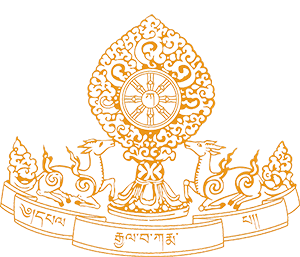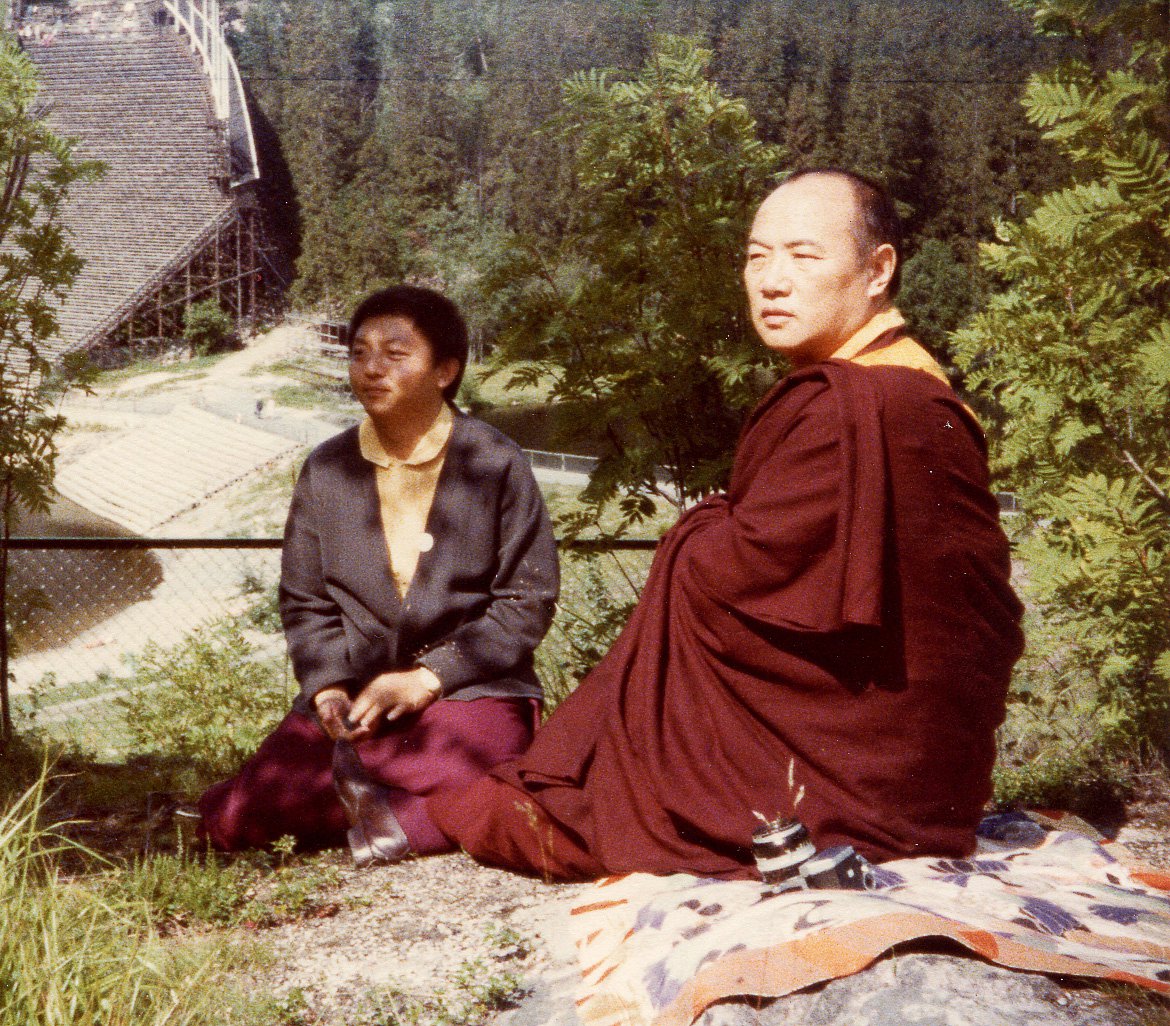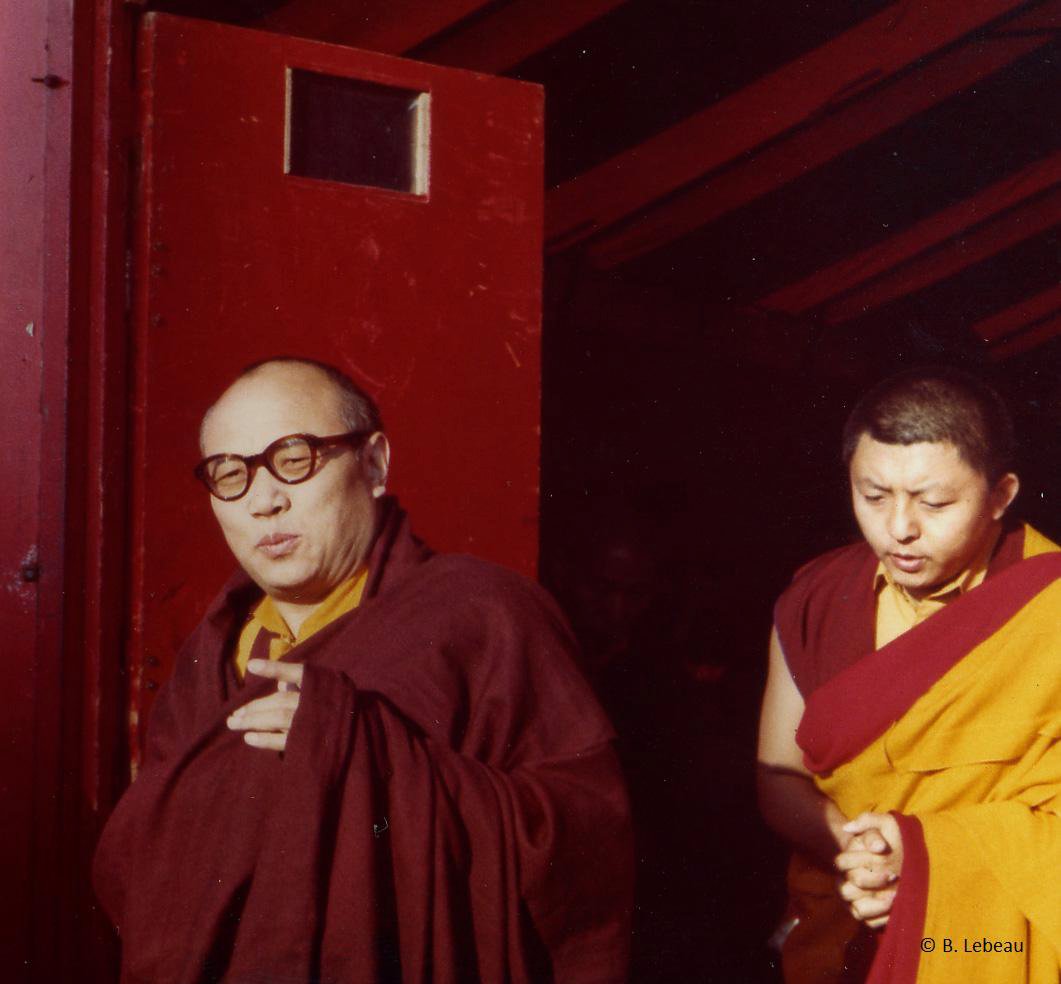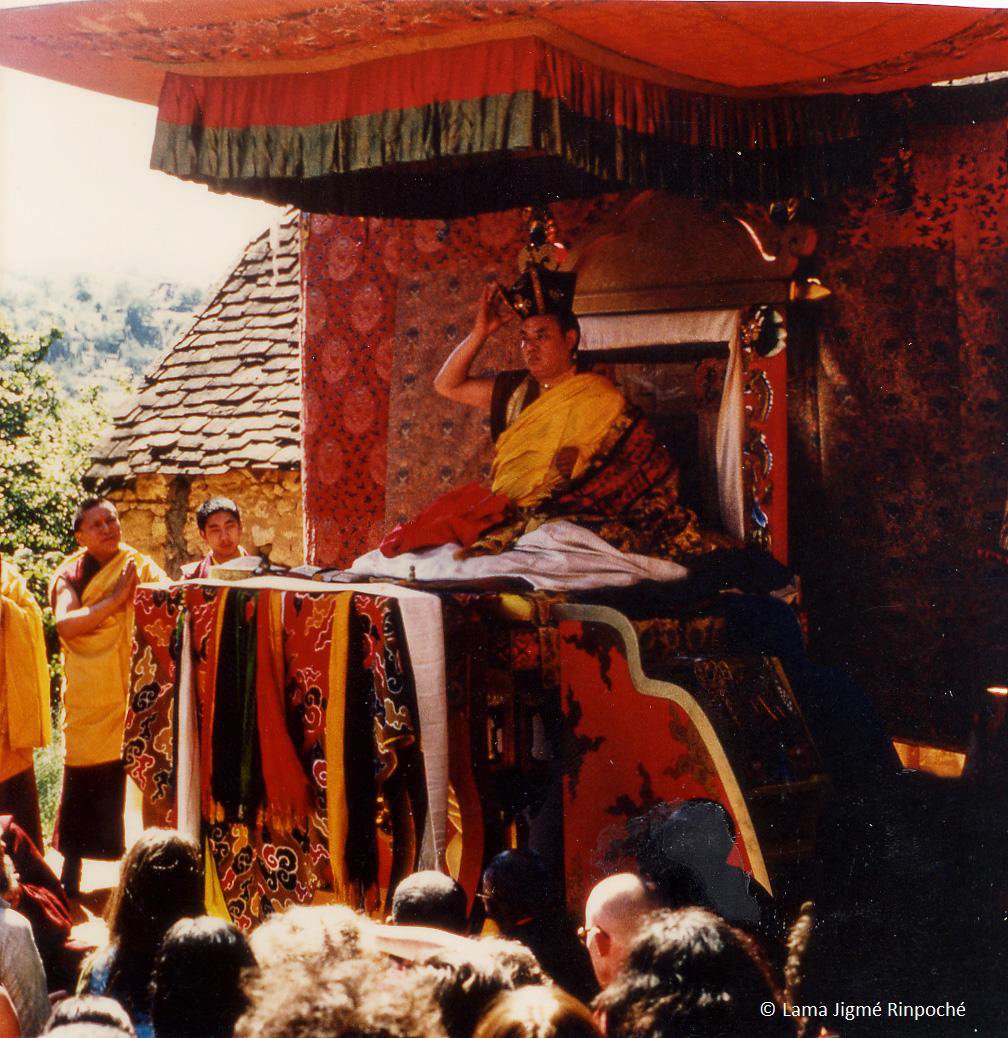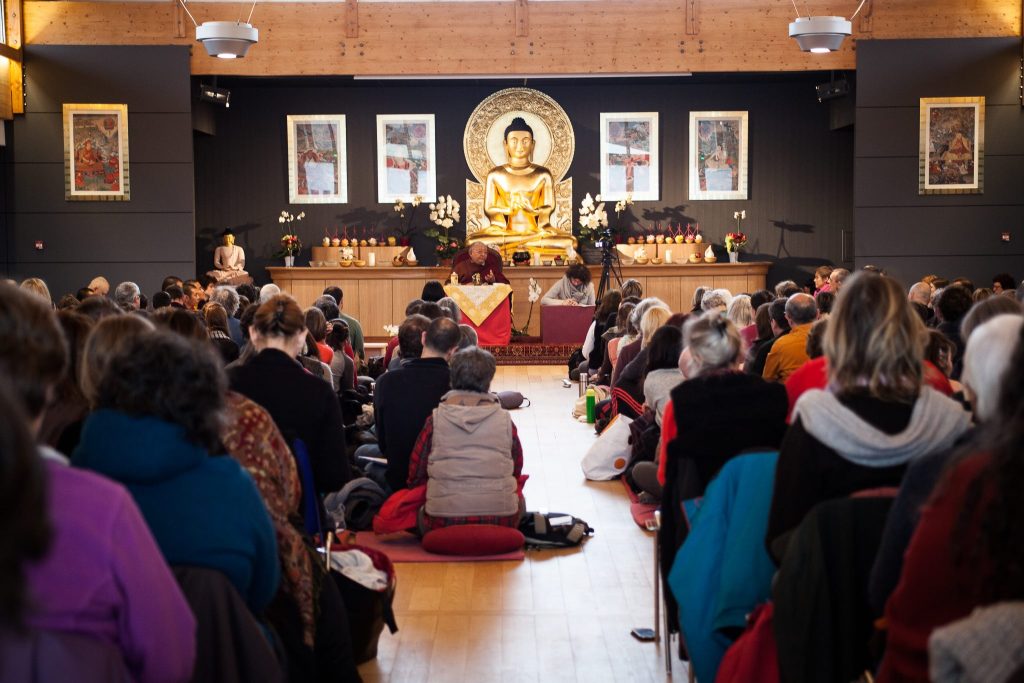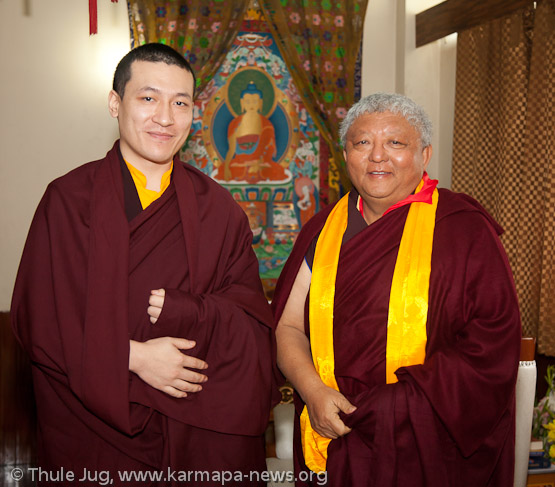About Jigme Rinpoche
Lama Jigme Rinpoche was born in Kham, Eastern Tibet, in 1949. As a child, together with his brother, the late 14th Kunzig Shamar Rinpoche, Mipham Chökyi Lodrö (1952-2014), he moved to Tsurpu, the monastery of the Karmapas in Tibet. After the Chinese invasion, in 1959, together with the 16th Karmapa, Rangjung Rigpe Dorje (1924-1981) and his entourage, he escaped to the kingdom of Bhutan first and to the then independent kingdom of Sikkim. Near Gangtok, at Rumtek, the King Tashi Namgyal offered a piece of land to Karmapa for him to have a place to settle in exile. In Rumtek, H.H. Karmapa founded a monastery, his main seat in exile, in order to ensure the continuity of the Karma Kagyu lineage.
In addition to receiving all the main transmissions and teachings of the Karma Kagyü lineage from H.H. Karmapa, Lama Jigme Rinpoche was in close touch with many other eminent masters of the time such as Gendün Rinpoche (1918-1997), Pawo Rinpoche (1912-1991), Kalu Rinpoche (1905-1989) and Dilgo Khyentse Rinpoche (1910-1991), Düjom Rinpoche (1904-1987), Sangye Nyenpa Rinpoche (1897-1962), Khandro Orgyen Tsomo Rinpoche (1897-1961) and Gyatrul Rinpoche (1894-1959), receiving many teachings and initiations from them as well.
“From Dujom Rinpoche, I learned how to speak and teach; from Dilgo Khyentse Rinpoche, I learned how to dedicate myself to people. From Kalu Rinpoche, Gendün Rinpoche, and Pawo Rinpoche, I learned how to preserve an authentic transmission.”
In response to the invitation of some of his students and to the demand of an ever-increasing number of people interested in Buddhism, the 16th Karmapa came to Europe for the first visit in 1974.
In 1975, the 16th Karmapa received a piece of land in Dordogne (South-West of France). Through a week of intensive Korlo Demchok practice, he took possession of the ground and sealed there the blessing of the Karma Kagyü lineage in Europe, just as he did for Rumtek monastery in the ’60s and in the same way the 1st Karmapa, Düsum Khyenpa (110-1193) blessed the ground when he established the Tsurpu monastery. He named the place Dhagpo Kagyu Ling, “the place of the transmission of the teachings,” and designated it his principal seat, the heart of the European network of the lineage. Later, in 1980’, Shamar Rinpoche also did an intensive practice of Gyalwa Gyamtso over a few days.
Upon his return to Europe, the 16th Karmapa explained that five conditions were necessary for Dharma to flourish and be established on a sustainable basis:
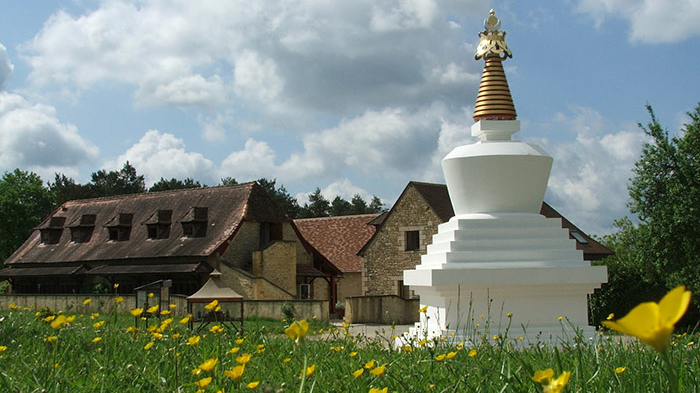
1. A network of centers for Buddhist studies and meditation open for all.
Two public centers in Dordogne and Auvergne and close to seventy local satellite centers in France and Europe where individuals can discover Buddhism and exchange, study, and meditate regularly close to home.
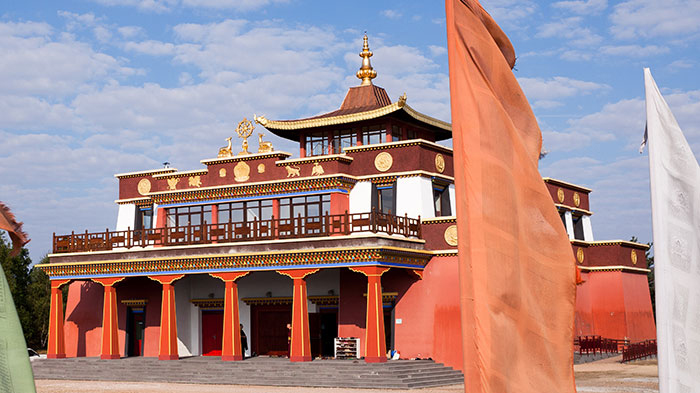
2. A monastery to ensure the continuity of a living tradition.
A place in Auvergne to consecrate one’s life to study and meditation in a monastic context and a great temple where monks, nuns, and laypeople come together to receive teachings and practice together.
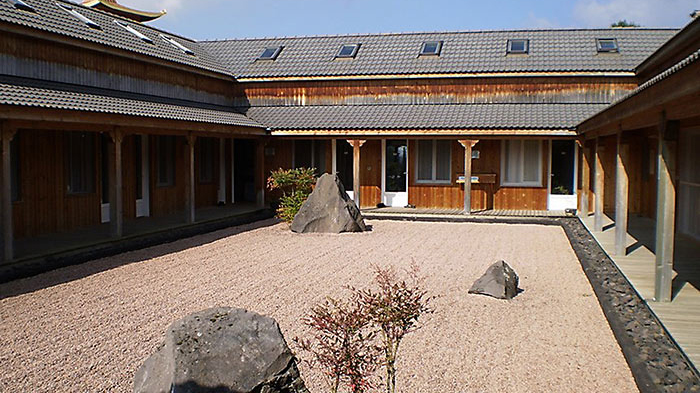
3. Retreat centers to deepen one’s knowledge by intensive meditation practices.
A space in the Dordogne dedicated to the profound study of Buddhism, open to interdisciplinary dialogue, and peopled with individuals involved in research at the crossroads of knowledge.
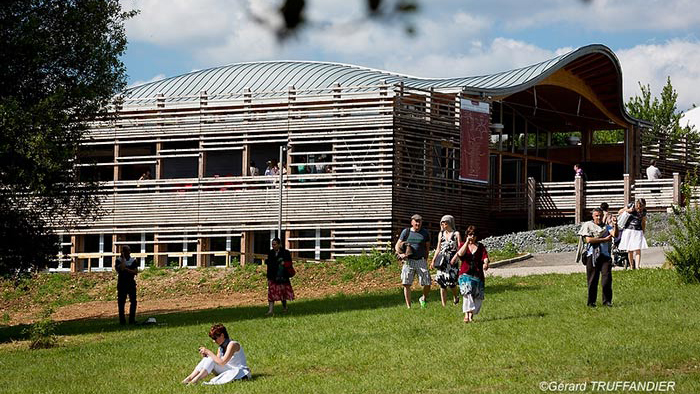
4. An Institute to explore contemporary Buddhism.
Several retreat centers and a public hermitage in Auvergne to receive and practice an authentic tradition.
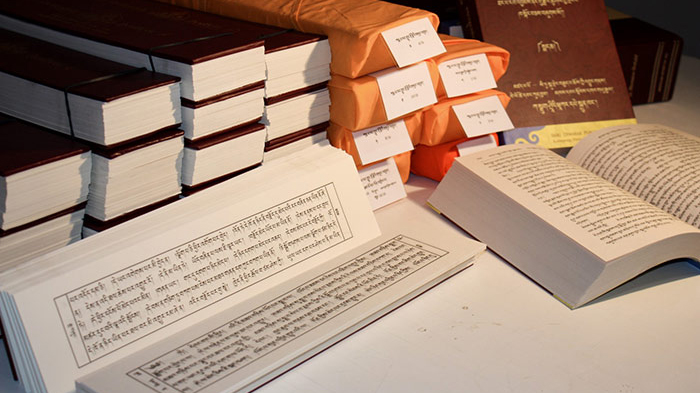
5. A library to preserve the teachings and render them accessible.
Exceptional Western and Tibetan library holdings in the Dordogne, which are available to all—from the passing visitor to the university researcher, and a quiet and comfortable reading room.
He appointed Lama Jigme Rinpoche to be his official representative to Europe and sent Gendün Rinpoche and Pawo Rinpoche to join him and help in bringing these five conditions to fruition. Before leaving Europe, the 16th Karmapa said:
“In the person of Lama Jigme Rinpoche, I leave you my heart”.
Jigme Rinpoche is the founder of the first non-catholic religious congregation in France, Karmé Dharma Chakra, which was approved by the French State authorities and which greatly contributed to the settling of Dharma in Europe for all schools of Buddhism.
Jigme Rinpoche undertook the development of Dhagpo Kagyu Ling, as well as a journey to traverse and understand the European continent. The knowledge of Westerners that he has acquired over the last fifty years facilitates a fluid adaptation of the Buddha’s teachings to Western society.
Jigme Rinpoche’s natural ease of communication with people from all walks of life, educators, youth, caregivers, etc., allows him to inspire all those whom he meets. His wish for religious and spiritual harmony led him to publish a series of interviews with Robert Le Gall, archbishop of Toulouse, to great success in France. This encounter between Catholic and Buddhist traditions opened a door for a better understanding of Buddhist values in the West. Founded on his resolutely modern approach to teaching, Jigme Rinpoche has acted as a consultant to managers, executives, and business schools (ESSEC, HEC Paris). In addition, he is the founder or president of numerous humanitarian foundations and associations (Infinite Compassion, École dans le ciel (“School in the Sky”), Tibet Save & care, Ethic). He is teaching all over the world in the Buddhist organizations link to Karmapa Thaye Dorje: Bodhi Path, Diamond Way and Dhagpo mandala.
On December 2012, Thaye Dorje, the 17th Karmapa, appointed him as his General Secretary in charge of his administrative duties for the Karma Kagyu lineage worldwide. Jigme Rinpoche is thus traveling far and wide, overseeing the running and development of the Karma Kagyu centers and monasteries directly linked to Karmapa.
Since the passing of the 14th Shamar Rinpoche in 2014, for the sake of preserving and prolonging his work for the welfare of sentient beings, Jigme Rinpoche is taking care of the education system Shamar Rinpoche built up with a primary school (in Takdha, near Darjeeling, India), the Diwakar Buddhist Academy (Kalimpong, India) and an institution for advanced studies in Buddhism in Sharminub (Kathmandu, Nepal).
He is currently teaching all over the world within the Buddhist organizations link to Karmapa Thaye Dorje: Bodhi Path, Diamond Way and the Dhagpo mandala.
Thanks to his infallible efforts, today the five necessary resources for Buddhism to take root have been developed and made available on the European soil. Following this first milestone in creating autonomy for Buddhism in the West, Jigme Rinpoche also trains and instructs the Western teachers of Dharma (both lay and monastic alike) mainly in France and Germany.
Besides, Jigme Rinpoche is the author of several books translated in numerous languages.
